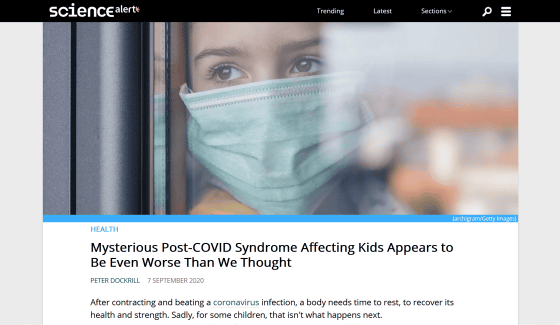What is 'large-scale inflammation' that attacks children after the new coronavirus infection is cured?

While
Multisystem inflammatory syndrome in children: A systematic review-EClinicalMedicine
https://www.thelancet.com/journals/eclinm/article/PIIS2589-5370(20)30271-6/fulltext
Post-COVID syndrome severely damages children's hearts;'immense inflammation' causing cardiac blood vessel dilation-UT Health San Antonio
https://news.uthscsa.edu/post-covid-syndrome-severely-damages-childrens-hearts-immense-inflammation-causing-cardiac-blood-vessel-dilation/
Mysterious Post-COVID Syndrome Affecting Kids Appears to Be Even Worse Than We Thought
https://www.sciencealert.com/mysterious-post-covid-syndrome-is-severely-damaging-kids-hearts-new-study-shows

MIS-C is a pediatric disease with severe vascular inflammation, rash, severe abdominal pain, continued fever, swelling of the tongue, heart failure, nerve damage, etc. It is said to develop later. The number of children with this disease discovered in the beginning of 2020 is more than hundreds, if only confirmed.
To investigate MIS-C, an American research team analyzed 662 MIS-C cases reported between January 1 and July 25, 2020. The average length of hospital stay for children surveyed was 7.9 days, 71% of which were in the intensive care unit (ICU). The most common symptoms among children were fever (100%), abdominal pain or diarrhea (73.7%), vomiting (68.3%), and 60% of the total showed shock symptoms.
It has been pointed out that COVID-19 is less likely to cause severe illness in children, but MIS-C seems to have confirmed many cases of severe illness. According to the research team, 22.2% of the cases investigated require mechanical ventilation with a ventilator, and

According to Alvaro Moreira, the author and assistant professor of pediatrics, the mild symptoms of COVID-19 do not necessarily mean MIS-C. In this survey, it was confirmed that even children with extremely mild or no COVID-19 symptoms could develop MIS-C.
Moreira said, 'According to the literature, children developed MIS-C without the common upper respiratory symptoms of COVID-19. This is scary.' It could have been symptom-free, no one might even know it was ill, and a few weeks later, it could cause excessive inflammation in the body.'
The inflammation in the body seen with MIS-C affects a wide variety of organs and parts such as the heart, lungs, gastrointestinal tract, and nervous system. The amount of inflammation seems to exceed that of similar diseases such as Kawasaki disease and toxic shock syndrome , but fortunately it seems that the immunoglobulin therapy used to treat Kawasaki disease is effective for MIS-C. ..
It is also known that MIS-C causes heart abnormalities. 90% of children had an echocardiographic examination because they had symptoms of heart disease, and 54% of the children underwent 'reduced ability of the heart to pump blood' 'dilated coronary arteries' 'arteries' It seems that an abnormality such as 'formation of a bump' was seen. Children with aneurysms in approximately 10% of all coronary arteries require multiple ultrasonography observations and long-term follow-up.

Another fact found in this study is that half of the children who develop MIS-C have an underlying disorder, and half are obese or overweight. 'In general, both adults and children, obese patients will have worse results,' Moreira said.
Related Posts:
in Science, Posted by log1h_ik







